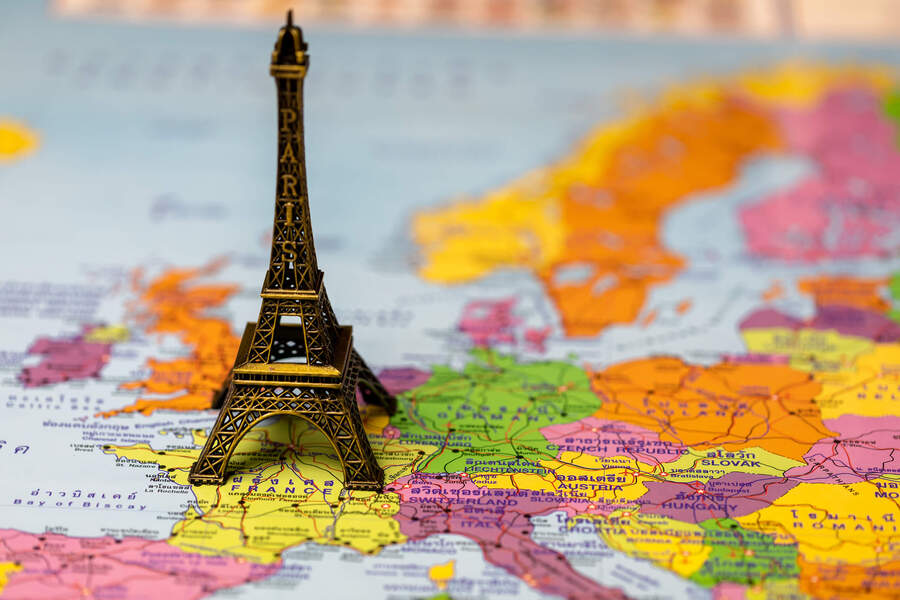
French Flirting and Language Learning
Frankly, flirting should be a mandatory part of any French course. Having someone to flirt with (among other things) leads to extremely motivated language learning and improves retention. You’re not going to ever forget those sweetly muttered nothings if they get you some action, are you?
The converse is also true. Improving your French makes it so much easier to flirt. Yes, sure, there are people out there who can flaunt their extravagant cocktail budgets or normal-shaped knees. For the rest of us, a bit of verbal charm is going to be necessary to get anywhere.
Flirting in French: 29 Flirtatious Phrases for Getting It On in the Hexagon
Literally, that one translates as “you’ve got beautiful eyes, you know?” but it comes off as an extreme cliché, like the English “do you come here often?” You shouldn’t ever say it for real, but you might try employing it ironically, laying on your foreign accent very thickly and giving a wink—as if you’re “just practicing” your new language.
Well, you could say t’es beau/t’es belle (you’re beautiful), but you should really only say this after you’ve established a relationship with someone. Both French guys and girls seem to be easily scared off by directness, tending to prefer a bit more subtlety.
A much more successful concept to keep in mind for French dating (as well as conversation in general) is that of deuxième degré (second degree). What this means is speaking ironically—not saying or taking things at face value.
Troisième degré (third degree) means that you’re being even more ironic and less sincere. For example, saying “t’as des beaux yeux, tu sais” to someone you would clearly not flirt with (to your baker as you get the change, or between two straight dudes).
La bise is the practice of the non-romantic kisses on the cheeks used for greeting someone and saying goodbye. These innocent kisses can quite easily become something more. In fact, after more than a decade of flirting in continental Europe, I honestly can’t even remember how Americans manage to work up to their first bisou sur la bouche (kiss on the lips). It must be hard.
There are a couple of other classic French excuses for planting a first kiss.
You can say t’as une miette (you’ve got a crumb) as you pretend to stroke something off of someone’s face, first with your fingers, then with your lips.
For the younger or more inebriated set, there’s the classic game tourner la bouteille (spin the bottle). It’s the same concept as our version, and, before you laugh it off, I have personally seen a romance between a couple of French natives go on to last years after getting sparked on my living room floor. And I’m pretty sure they never would have had the guts to kiss each other otherwise. Action-vérité (truth or dare) is, similarly, a classic. Say “action” and, if your friends have any sense at all, they’ll dare you to smooch someone lovely.
The faux ami (false cognate) exciter that you were warned away from in French class is, finally, useful once you’re in a romantic situation. Tu m’excites ! means “you turn me on!”
When I first moved to France, I was a more than a little surprised to hear some definitely love-free trysts referred to as faire l’amour. Yes, the phrase means “to make love,” but it’s also used to describe hookup-like situations where love is absent. So, even if you’re not quite ready for the L word, don’t be concerned if some lovely French thing says, “j’ai tellement envie de faire l’amour avec toi !” (I really want to make love with you!)
Coucher avec is an informal—but not vulgar—verb phrase for romantic encounters. For example, j‘ai couché avec monsieur le president (I slept with the president) was a commonly-used phrase during the periods of the French republics.
The American concept of “dating” doesn’t really exist in France. “A date” in the subtitles of American TV shows is sometimes rendered un rendez-vous galant, but really, nobody in France would ever ask anyone to do one of those. You can instead say on prend un verre/un café (let’s go for a drink/a coffee). Do not make the romantic intentions explicit. Passion is supposed to “just happen.”
Likewise, there’s no “just dating” period where you go out with a few people at once, as there is in the States. If a hookup was more than a one time thing, there will be a strong presumption that it’s immediately a monogamous relationship. Congratulations, once you get to this stage in the relationship you can say on sort ensemble (we’re going out) or on est ensemble (we’re together).
Americans’ use of baseball terms to describe their degrees of sexual conquest (“she got to second base!”) has a much more innocent equivalent in France. The metaphor used is like going into first gear, second gear, etc. Première vitesse (first gear) is going out for a drink, deuxième vitesse (second gear) is achieved when the pair realizes their shared interest in something more and troisième vitesse (third gear) is making out.
If you’re a foreigner in France, be prepared for that horrible question that travelers are asked anywhere: Elles sont difficiles les Américaines/Françaises/Espagnoles/Russes… ? (“Are American/French/Spanish/Russian women difficult (to start a relationship with/to flirt with)?”) The question isn’t horrible itself, I suppose—cultural differences in romance definitely exist—but the subtext is perhaps a bit sexist.
One way to politely avoid it is saying something like, “Ça dépend, bien sûr !“ (That depends, of course!) or “L’amour est toujours très compliqué !“ (Love is always very complicated!)
Ways to Flirt in French Without Moving to France, Africa or Quebec
I do realize that some of you live in tragic locales where there aren’t a lot of French-speaking people to flirt with. But that doesn’t mean you can’t flirt in French—enter the internet!





